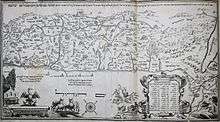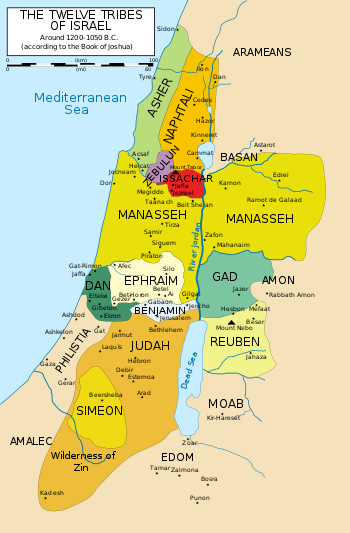Tribe of Naphtali
| Tribes of Israel |
|---|
 |
| The Tribes |
| Related topics |
The Tribe of Naphtali (Hebrew: נַפְתָּלִי, Modern Naftali, Tiberian Nap̄tālî, "My struggle") was one of the twelve tribes of Israel. It was one of the northernmost of the tribes. It is one of the ten lost tribes.
Biblical Narrative
In the biblical account, following the completion of the conquest of Canaan by the Israelite Joshua allocated the land among the twelve tribes. Kenneth Kitchen, a well-known conservative biblical scholar, dates this event to slightly after 1200 BCE.[1] However, the consensus view of modern scholars is that the conquest of Joshua as described in the Book of Joshua never occurred.[2][3][4]
According to the Bible Joshua assigned Naphtali the eastern side of the Galilee (on the immediate west of the Sea of Galilee), in the areas now known as the Lower Galilee, and Upper Galilee, bordered on the west by Asher, in the north by Dan, in the south by Zebulun, and by the Jordan River on the east.[5] The most significant city was Hazor.
In this region, bordering the Sea of Galilee, was the highly fertile plain of Gennesaret, characterised by Josephus as the ambition of nature, an earthly paradise,[6] and with the southern portion of the region acting as a natural pass between the highlands of Canaan, several major roads (such as those from Damascus to Tyre and Acre) ran through it.[7] The prosperity this situation brought is seemingly prophesied in the Blessing of Moses, though textual scholars view this as a postdiction, dating the poem to well after the tribe had been established in the land.[8][9]
From after the conquest of the land by Joshua until the formation of the first Kingdom of Israel in c. 1050 BC, the Tribe of Naphtali was a part of a loose confederation of Israelite tribes. No central government existed, and in times of crisis the people were led by ad hoc leaders known as Judges (see the Book of Judges). With the growth of the threat from Philistine incursions, the Israelite tribes decided to form a strong centralised monarchy to meet the challenge, and the Tribe of Naphtali joined the new kingdom with Saul as the first king. After the death of Saul, all the tribes other than Judah remained loyal to the House of Saul, but after the death of Ish-bosheth, Saul's son and successor to the throne of Israel, the Tribe of Naphtali joined the other northern Israelite tribes in making David, who was then the king of Judah, king of a re-united Kingdom of Israel. However, on the accession of Rehoboam, David's grandson, in c. 930 BC the northern tribes split from the House of David to reform a Kingdom of Israel as the Northern Kingdom.
In c. 732 BCE, Pekah allied with Rezin, king of Aram, threatened Jerusalem, and Ahaz, king of Judah, appealed to Tiglath-Pileser III, the king of Assyria, for help. After Ahaz paid tribute to Tiglath-Pileser, (2 Kings 16:7-9) Tiglath-Pileser sacked Damascus and Israel, annexing Aram[10] and a large part of Israel, "including all the land of Naphtali." According to 2 Kings 16:9 and 15:29, the population of Aram and the annexed part of Israel was deported to Assyria. The kingdom of Israel continued to exist until c. 723 BC, when it was again invaded by Assyria and the rest of the population deported.
From that time, the Tribe of Naphtali has been counted as one of the Ten Lost Tribes of Israel.
Origin

According to the Torah, the tribe consisted of descendants of Naphtali, a son of Jacob and Bilhah, from whom it took its name. However, Biblical scholars view this as a postdiction, an eponymous metaphor providing an aetiology of the connectedness of the tribe to others in the Israelite confederation.[11]
Character
Militarism is featured in Naphtali's history. In the ancient Song of Deborah, Naphtali is commended, along with Zebulun, for risking their lives in the fight against Sisera;[12] in the prose account of the event,[13] which textual scholars regard as a much later narrative based on the poem,[11][14] there is the addition that Barak, the leader of the anti-Sisera forces, hails from the tribe of Naphtali.[15] In the Gideon narrative Naphtali are one of the tribes which join in an attack against Midianite invaders, though textual scholars regard the Gideon narrative as being spliced together from at least three earlier texts, the oldest of which describes only personal vengeance by Gideon and 300 men of his own clan, not a battle in which the rest of the northern tribes join him.[16] In the Blessing of Jacob, which textual scholars date to 700-600 BC - and thus a postdiction, Naphtali is compared to a hind let loose, and commended for giving goodly words.[17]
The territory allotted to the tribe in Canaan was in the extreme north, and was bordered on the north by the Litani River, on the east by the River Jordan until it was 12 miles (19 km) south of the Sea of Galilee, on the west by the tribes of Asher and Zabulon; and on the south by the tribe of Issachar.[18]
Fate
As part of the Kingdom of Israel, during one of the several wars between the kingdoms of Judah and Israel, Naphtali was persecuted by Ben-Hadad, the king of Aram-Damascus, on behalf of Asa, the king of Judah, and desolated. Centuries later, the Assyrians invaded Israel, which, though it had been a tributary, had also defaulted, and so Naphtali, one of the most northerly tribes, became one of the first to be conquered. With the land taken, the tribe were exiled; the manner of their exile led to their further history being lost.
The symbol of the tribe is a gazelle-a very quick animal. The people of Naftali is traditionally thought of as swift (swift runners).
There has been speculation that the Bukharian Jews of Central Asia are the descendants of the Naphtali tribe.[19]
References
- ↑ Kitchen, Kenneth A. (2003), "On the Reliability of the Old Testament" (Grand Rapids, Michigan. William B. Eerdmans Publishing Company)( ISBN 0-8028-4960-1)
- ↑ “Besides the rejection of the Albrightian ‘conquest' model, the general consensus among OT scholars is that the Book of Joshua has no value in the historical reconstruction. They see the book as an ideological retrojection from a later period — either as early as the reign of Josiah or as late as the Hasmonean period.” K. Lawson Younger, Jr. (1 October 2004). "Early Israel in Recent Biblical Scholarship". In David W. Baker; Bill T. Arnold. The Face of Old Testament Studies: A Survey of Contemporary Approaches. Baker Academic. p. 200. ISBN 978-0-8010-2871-7.
- ↑ ”It behooves us to ask, in spite of the fact that the overwhelming consensus of modern scholarship is that Joshua is a pious fiction composed by the deuteronomistic school, how does and how has the Jewish community dealt with these foundational narratives, saturated as they are with acts of violence against others?" Carl S. Ehrlich (1999). "Joshua, Judaism and Genocide". Jewish Studies at the Turn of the Twentieth Century, Volume 1: Biblical, Rabbinical, and Medieval Studies. BRILL. p. 117. ISBN 90-04-11554-4.
- ↑ ”Recent decades, for example, have seen a remarkable reevaluation of evidence concerning the conquest of the land of Canaan by Joshua. As more sites have been excavated, there has been a growing consensus that the main story of Joshua, that of a speedy and complete conquest (e.g. Josh. 11.23: 'Thus Joshua conquered the whole country, just as the LORD had promised Moses') is contradicted by the archaeological record, though there are indications of some destruction and conquest at the appropriate time.Adele Berlin; Marc Zvi Brettler (17 October 2014). The Jewish Study Bible: Second Edition. Oxford University Press. p. 951. ISBN 978-0-19-939387-9.
- ↑ Joshua 19:32-39
- ↑

- ↑ G. A. Smith, "The Historical Geography of the Holy Land,"
- ↑ Richard Elliott Friedman, Who Wrote the Bible? (Harper San Francisco) (1987) ISBN 0-06-063035-3
- ↑ Peake's commentary on the Bible
- ↑ Lester L. Grabbe, Ancient Israel: What Do We Know and How Do We Know It? (New York: T&T Clark, 2007): 134
- 1 2 Peake's Commentary on the Bible
- ↑ Judges 5:18
- ↑ Judges 4
- ↑ Jewish Encyclopedia, Song of Deborah'
- ↑ Judges 4:6
- ↑ Jewish Encyclopedia, Gideon
- ↑ Genesis 49:21
- ↑ Joshua 19:33-34 quoted in

- ↑ Ehrlich, M. Avrum Encyclopedia of the Jewish Diaspora: Origins, Experiences, and Culture ABL-CIO October 2008 ISBN 978-1-85109-873-6 p.84
![]()